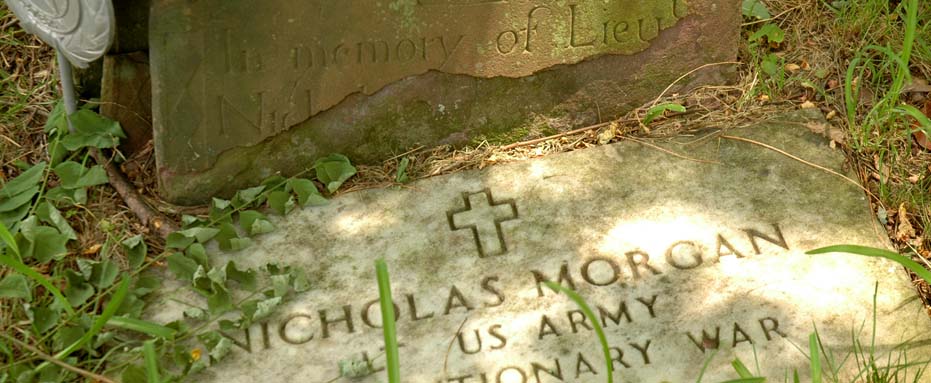Morgan Moment – Death of Lieutenant Nicholas Morgan
Many thanks to Larry Kidder from Crossroads of the American Revolution for helping me finally find the below article from the December 25, 1782 New Jersey Gazette about the sad and untimely death of Lieutenant Nicholas Morgan. Lt. Morgan is buried just a few hundred feet away from my childhood bedroom. While all the neighborhood kids in my time had traveled through the Morgan Family Cemetery a bazillion times (its fenced now), it wasn’t until I was significantly older that I started to think about the people buried there. Because it was so familiar, I never gave thought to the fact that there were, for the United States, some very, very old graves there.
Lieutenant Nicholas Morgan is in one of the oldest graves in the Morgan Family Cemetery, perhaps the oldest. He was killed – in Morgan – during the Revolutionary War. Think about that for a moment. A number of skirmishes of the Revolutionary War actually took place in Morgan. That still blows my mind. There has been peace so long in Morgan that it is nearly impossible to fathom that there was ever a time in New Jersey when people couldn’t image anything other than the war they were somehow living though. While this concept is reassuring, i.e., that one time war zones can someday become so peaceful for so long that people lose the knowledge that there was ever a conflict there. Unfortunately, its corollary is the complete opposite of reassuring, i.e., that any long time peaceful place can at any time become a war zone. Think Syria, Vietnam, France, England, Germany … the list is endless in both directions.
Watch for Larry’s upcoming short write-up about Captain James Morgan, Sr. (Nicholas’ father) in the “Meet Your Revolutionary Neighbors Project” section of the Crossroads of the American Revolution web site.
The below article is available on GenealogyBank.com, a source for thousands of newspaper archives, obituaries, genealogy records, military records, and more. You’ll note that due to the time period in which it was written, you will often see an ‘f’ character which, in present days, would be written as an ‘s’.
You will also read “his piece flashed…” This means that Lt. Morgan’s musket (predecessor of the rifle) did not fire correctly, i.e., the flint used to ignite the gunpowder sparked but the spark did not set off the gunpowder, which in turn, did not shoot out the musket ball. This is the origin of the phrase “a flash in the pan”.
TRENTON, December 25.
“On Monday the ninth inst. About 11 o’clock at night, Lieutenant Nicholas Morgan, of the state regiment, was mortally wounded by a party of refugees from New-York, of which wound he died about four hours after.–The circumstances are related as follow :
“He was on guard on the shore of South-Amboy, and seeing a party coming toward him, supposed they were his own men until they came pretty near, which, on challenging them, he found his mistake and attempted to fire, but his piece flashed, upon which they instantly fired, wounded him, and, running into an adjacent swamp, made their escape.–Thus fell Lieutenant Morgan, in the 28th year of his age.–His corpse was carried to his father’s house, from whence it was buried on the 11th with the honours of war, attended by a great number of friends and acquaintances.–A sermon was preached by the Revd. Di. Du-Bois, from the Matt. xxiv, 44.–Therefore be ye also ready : for in such an hour as ye think not the Son of man cometh.
“Lieut. Morgan possesses the spirit of patriotism and the virtues of hospitality in an eminent degree.–He felt warmly attached to the cause of his country, and therefore took a particular pleasure in rendering it any services in his power.–In his last moments he displayed the utmost composure and resignation of mind, which proceeded from a consciousness of a life well spent, and from a grounded hope of the divine acceptance.–The general sorrow of the numerous assembly which attended the funeral, was striking testimony of the sense they had of his merit and of their loss.”
Originally posted on June 11, 2016.
